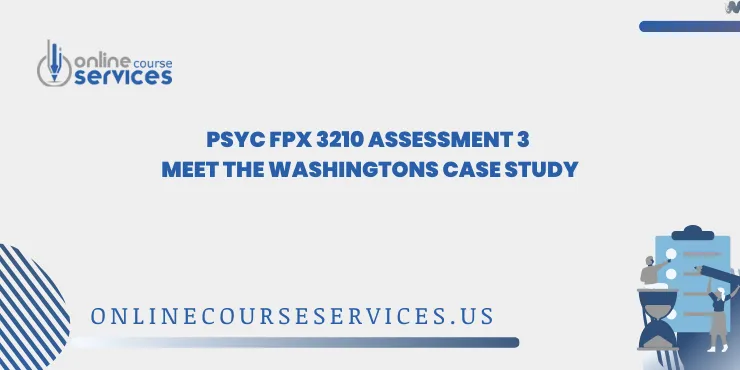- PSYC FPX 3210 Assessment 3 Meet The Washington Case Study.
Introducing Kyla Washington
Learn to become acquainted with Kyla, a recalcitrant 16-year-old adolescent female. She is the oldest of the Bounce-Lorraine females and resides with her two sisters, older brother, and great-grandmother. Hiking as a lifestyle is Kyla’s pastime, and she enjoys closeness with her mum but not her father. Bodily and psychosocial maturity define her life since she continues to be in this stage of development. Let us trace Kyla’s development using Erikson’s stages of psychosocial, psychosocial development, family, interpersonal relationships, and ethics as their role in development.
Psychosocial Stage of Development
Adolescence and Identity Formation
Kyla is 16 years old and mid-adolescent, and the task is to establish one’s identity according to Erik Erikson’s theory of psychosocial psychosocial development. Identity vs. Role Confusion has also been referred to as this stage, and identity explorations, calling, and personal values are discussed (Vogel-Scibilia, 2009).
Passion for cooking is the spice of discovery for Kyla. She was not made to cook by society but something that emerged naturally as a result of careful effort on her part, a niche-picking hypothesis (Scarr & McCartney, 1983). Leisure time is time she invests in reading recipes and also sets aside money to go to culinary school. This action shows future dedication to a vocation, a foreclosure of self—a closing type wherein she has chosen a line without opening to questioning. Reinforcement and Behaviorism
Kyla’s passion for cooking is reinforcement-based. Reinforcement of compliments about her cooking makes her a culinary artist. Reinforcement theories believe reinforcement sustains behaviour, and Kyla’s frequent praise sustains her interest and faith in her future career (Scott, 2021).
Reinforcement and Behaviorism
Parent-Child Relationships
The Bond with Her Mother
Kyla and her mom get along just fine because they share a common love for cooking. This is some quality time, and this strengthens their relationship even more. Kyla’s support of such an issue goes a long way in maintaining her relationship, identity, and self-esteem.
Challenges with Her Father
However, Kyla’s dad and Kyla share a relationship characterized by limitless, wracking agonies.
Teenagers like Kyla also enjoy pushing boundaries and desire to be treated like adults, which will most likely lead to parent-child conflict (Adams & Laursen, 2001). Conflicts may arise from day-to-day things, such as social media usage, which is one of the daily conflicts for teenagers. As Kyla matures and the rest of the family becomes more proficient at resolving the conflicts, the brawls will die out.
Social Media Influence
Social media extensively influences Kyla’s behaviour and self-thought. Like a one-of-a-kind young adult, she is endorsed via the technique of the range of likes and remarks she gets on her social media updates. This creates the notion of the “imaginary intention market,” which teenagers enjoy even though they are continuously being watched and scrutinized (Elkind & Bowen, 1979).
Studies have have have confirmed that young adults tend to place massive importance on the views of others, which could affect peer relationships and self-concept (Bell & Bromnick, 2003). For Kyla, this is every functionality that concerns others and is vulnerable to emotional damage.
Ethical Considerations in Clinical Practice
Balancing Confidentiality and Parental Involvement
Moral problems in medical exercise, finding the steadiness among confidentiality and involvement of mother and father, and identifying independence with the requirements of ethics are necessary in situations with Kyla’s manipulation. Confidentiality is maximally integral, in line with the American mental firm (APA) Ethics Code. It gives a region for exception while disclosure saves you damage to the customer or zero.33 activities (APA, 2017).
There needs to be a frank dialogue concerning confidentiality limitations right from the beginning of the treatment, such as what can and can’t be disclosed to the parents. Therapists need to cope with Kyla on a one-on-one basis but with the parents’ access to treatment information to encourage the teenager to proper self-autonomy at times.
Conclusion and Recommendations
Kyla’s adventure inside the route of improvement replicates the adolescent’s not-unusual conflict and functionality for increase. From dealing with her own family life to coming across her interests, she illustrates grit and motive. To assist her construct:
Track Social Media Use: Social media use should be tracked to prevent risky consequences for your intellectual well-being.
Sell healthful interplay: Constructing Kyla’s war decision talent with her father could have an outstanding impact on their dating.
DeliverDeliver a boost to desired behaviours: Thecing her kitchen accomplishment can decorate her self-trust and self-trust career desires.
Appreciate Autonomy: Companions, children, and therapists should feel Kyla’s growing Autonomy except forsaking proper steering.
Via taking precautions to remediate within the one’s regions, Kyla can continue to prosper at this detail.
This unique and specific description follows PSYC FPX 3210 assessment three because it states developmental theories, circle of relatives functioning, and moral issues precisely and in an applicable system.

